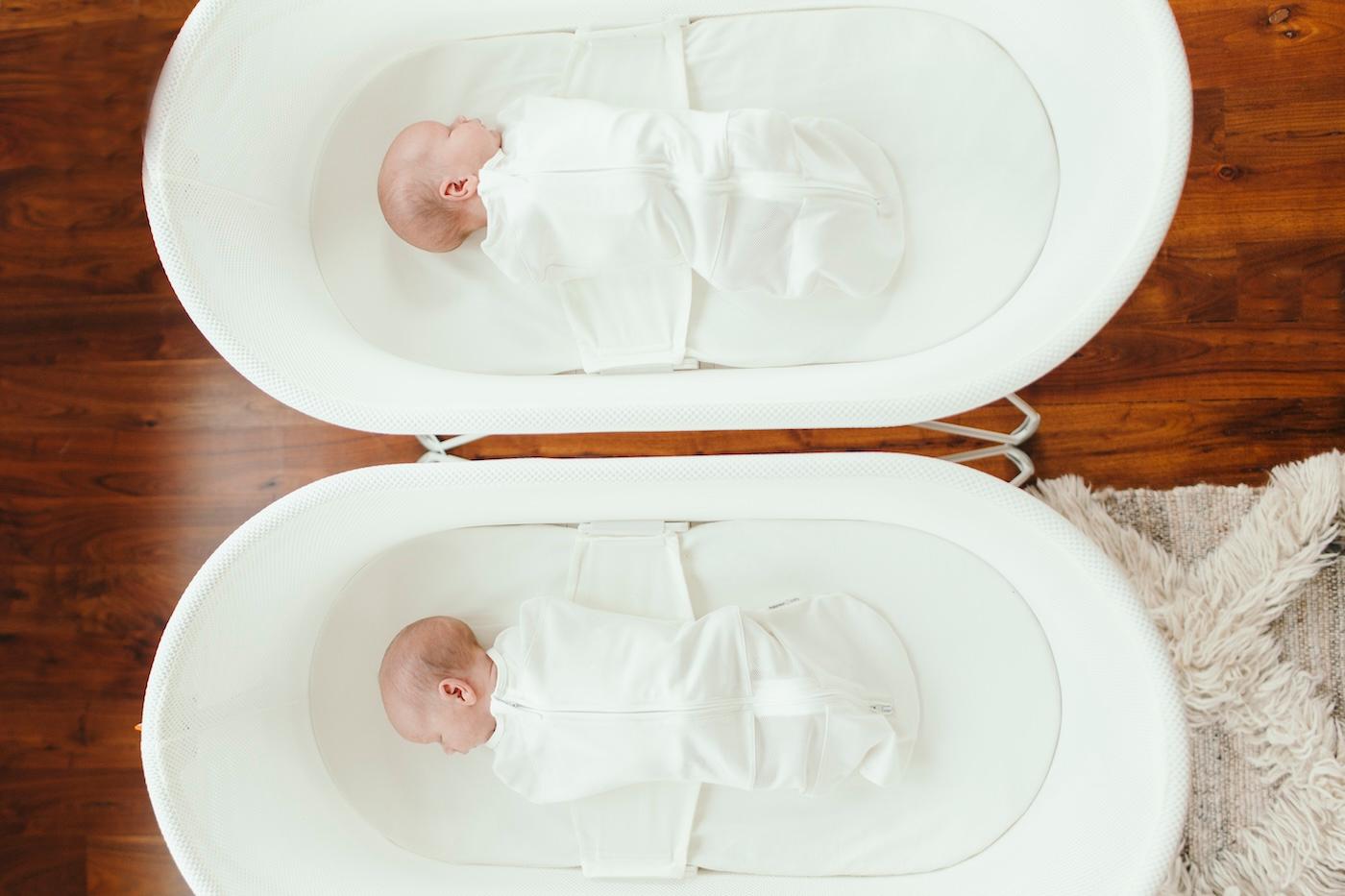PREGNANCY
The Importance of Third Trimester Sleep
ZZZs are more crucial than ever—here is how to get them!

Written by
Happiest Baby Staff

If you are not having trouble sleeping during your third trimester, go ahead and buy yourself a lottery ticket! Research shows that more than 98% of pregnant individuals wake throughout the night, 79% cannot find a comfortable sleeping position easily, and up to 80% of expecting mums experience insomnia by the end of the third trimester. In short: Pregnancy sleep problems are super common, and third trimester sleep problems are nearly inescapable. But that does not mean you should simply tough out your pregnancy sleep issues. In fact, doing so can be downright dangerous to you and your baby—especially in your third trimester.
PS: It is not too early to start thinking about fourth trimester sleep, too! Learn how SNOO adds up to 2 hours of sleep a night.
Why Sleep Is So Important in the Third Trimester
Sleep is considered an essential part of antinatal care. That is because getting high-quality sleep during pregnancy greatly influences a parent-to-be’s appetite, mood, memory, learning, and decision-making, all of which are super-important when getting ready to welcome a new baby. Plus, sleep helps regulate blood sugar and helps ensure your immune system is working as it should. But here is the rub with third trimester sleep: While experts agree that there is an increased need for sleep during this period, the third trimester is rife with serious sleep disturbances.
Common Third Trimester Sleep Problems
By the third trimester, parents-to-be experience a natural reduction in REM sleep, which is the type of sleep that boosts memory consolidation, emotional processing, and more. (It is also the stage of sleep where dreams occur.) Stage three non-REM sleep takes a hit late in pregnancy, too. That is important because this sleep stage is all about the deep, restorative rest that bolsters your immune function and helps your body and mind recover and reset so you can tackle another day. At the same time, pregnancy increases your risk for sleep disorders like restless legs syndrome, snoring, and obstructive sleep apnea. Plus, the increasing urge to pee in the middle of the night and the uptick of the hormone oxytocin late in pregnancy brings about fragmented sleep.
Whether due to pregnancy hormones, your expanding uterus, both, or something else, here are some common causes of third trimester sleep problems:
- Back pain
- Body temperature changes
- Difficulty getting comfortable
- Fragmented sleep
- Frequent nighttime urination
- Heartburn
- Nighttime leg cramps
- Obstructive sleep apnea (OSA)
- Restless legs syndrome (RLS)
- Snoring
- Stress and anxiety
Third Trimester Sleep Problems and Pregnancy Complications
Not getting enough late-pregnancy sleep does more than wreak havoc on your mood. Poor sleep during pregnancy may increase your odds of certain pregnancy complications, such as pre-eclampsia, gestational diabetes, and preterm birth, according to a 2023 report. Mums-to-be who experience poor sleep during pregnancy are also 3.72 times more likely to develop depression during pregnancy than those who slept well. Research shows that those who experience sleep problems late in pregnancy appear to experience longer labours, more fatigue throughout labour, higher levels of fear and anxiety during labour, and they are more likely to have a cesarean delivery, too.
The Lingering Impact of Third Trimester Sleep Problems
The sleep issues you encounter during pregnancy, especially during your third trimester, can have persistent effects even after your baby is born. For example, mums-to-be who had very poor sleep quality in their third trimester are most susceptible to “high-level depressive symptoms” in the postnatal period, indicates research published in the journal Frontiers in Psychiatry. Some reports note that the risk for postnatal depression is 2.71 times higher for those who slept poorly during pregnancy.
Another report, this one in BMC Pregnancy Childbirth, found that poor sleep in the third trimester may increase your risk of having a sleep disorder after your baby is born, too. The same researchers also discovered that a baby’s chance of developing a sleep disorder was about 2.6 times higher if their mum had a sleep disorder during their third trimester of pregnancy. (To help your newborn get the sleep they need, learn all about the 5 S’s for soothing babies now.)
How to Improve Sleep in the Third Trimester
First, the basics: Practice proper sleep hygiene, which includes going to bed and waking up at the same time every day. Ensure your bedroom is dark and free of distractions. (Blackout curtains or a sleep mask for the win!) Put an end to revenge bedtime procrastination by turning all devices off about 30 to 60 minutes before lights out. And keep your room between 20 and 22.2 degrees Celsius to help keep your warmer body cool enough for sleep.
Here are more proven ways to improve third trimester sleep:
- Roll over. One of the best sleeping positions in the third trimester is curling up on your left side, with your legs slightly tucked toward your chin. Slide a pillow under your belly or between your legs and then tuck a rolled-up blanket at the small of your back. This all works to help reduce uncomfortable swelling, haemorrhoids, and varicose veins in your legs.
- Go to bed before 11pm. Sleeping less than 7 hours—or going to bed after 11pm is associated with feeling markedly more fatigued in the third trimester, than folks who follow these sleep “rules,” suggests findings published the journal Frontiers of Psychiatry. For one, an earlier bedtime prolongs deep sleep (stage three non-REM sleep)—the sleep stage that chips away at fatigue.
- Try to resist napping. High levels of progesterone during pregnancy can cause lots of sleepiness during the day. However, resisting the urge to snag a midday nap during the third trimester may help preserve your biological sleep rhythms, which positively impacts sleep quality, according to a 2024 report in the Journal of Sleep Research.
- Take a pre-bedtime soak. The same 2024 report notes that taking a warm shower before going to sleep can help aid sleep in the third trimester. A 10-minute warm foot soak 1 to 2 hours before bedtime does the trick, too! Researchers note that this elevates your core body temperature, triggering subsequent heat loss, which ultimately helps folks fall asleep faster.
- Play white noise. During your third trimester, you naturally get less deep sleep, which makes middle-of-the-night wakeups even more of an issue. To counter this, turn to a white noise machine, like SNOObie, which is designed to mask sleep-disrupting sounds, like the traffic or a loud TV.
- Give yoga a spin. Practicing yoga four times in two weeks significantly improves sleep quality in the third trimester, a 2021 study showed. (Each yoga session was between 60 and 90 minutes.) That is because yoga can lower your heart rate, pulse, blood pressure, and respiratory rate—and increase your serotonin levels—all of which relaxes the body and improves sleep.
- Take some cleansing breaths. Mindful meditation during pregnancy not only help reduces stress and anxiety, but also improves sleep in all trimesters, according to a 2023 report. Here, 65% of expectant mums reported sleep improvements after using a meditation app twice daily for one month. For app-free at-home meditation help, try SNOObie, which features Magic Breathing tracks that synchronize light and sounds to guide you through your relaxation exercise.
- Relieve leg discomfort. Sleep-disturbing leg cramps are quite common during the third trimester. To help, drink 6 to 8 glasses of 200 ml of water every day—mostly in the morning and afternoon, not in the two hours before bedtime. (Otherwise, you will trade leg-cramp wakeups for I-have-to-pee wakeups!) Gently stretch your calves before bed by putting your hands on a wall, placing your right foot behind your left, and slowly bending your left leg forward, keeping your right knee straight with your right heel on the floor. Hold this stretch for 30 seconds, all while keeping your back straight and your hips facing forward. Switch legs and repeat.
- Consider cognitive behavioral therapy. If you are suffering with insomnia in your third trimester, talk to your healthcare provider about cognitive behavioral therapy for insomnia (CBT-I). A 2021 study in the journal Sleep Medicine found that even digital CBT-I can improve sleep quality and sleep duration during the third trimester—and after childbirth, too. (The CBT-I group slept an average of 40 minutes longer each night postpartum!)
- Treat Restless Legs Syndrome. While the prevalence and severity of restless legs syndrome during pregnancy is particularly high in the third trimester, most medicines to treat RLS are not recommended during pregnancy. That said, ask your healthcare provider if iron supplementation may help you. Otherwise, moderate-intensity exercise, yoga, and massage, have all been known to help quell sleep-stealing symptoms.
Disclaimer: The information on our site is NOT medical advice for any specific person or condition. It is only meant as general information. If you have any medical questions and concerns about your child or yourself, please contact your health provider. Breastmilk is the best source of nutrition for babies. It is important that, in preparation for and during breastfeeding, mothers eat a healthy, balanced diet. Combined breast- and bottle-feeding in the first weeks of life may reduce the supply of a mother's breastmilk and reversing the decision not to breastfeed is difficult. If you do decide to use infant formula, you should follow instructions carefully.
SHARE THIS ARTICLE
PARENT PICKS
Bestsellers



















